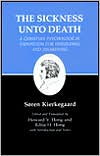

 |

|

The average rating for Kierkegaard's Writings, XIX: Sickness Unto Death: A Christian Psychological Exposition for Upbuilding and Awakening based on 2 reviews is 4.5 stars.
Review # 1 was written on 2016-08-28 00:00:00 Vivian Mckeithan Vivian MckeithanKierkegaard is a strange philosopher to discuss. His writing is incredibly dense in ideology while poetically preserving the aesthetic. I bought this book more than two years ago, along with "Fear and Trembling"; yet they have never left my bedside table. One can read this book a dozen times and still find new landscapes in his ideology. It was about time to revisit this book once again. It might sound ridiculous, but I find this book to be the greatest self-help book ever written. Its important to recognize "Despair" as a part of the self; its important to recognize "Despair" as the right path to actualization; or in Kierkegaard's vocabulary "Faith". Its normal for us to rebel against our existence and defy any eternal consolation for the sake of individuality; because what are we but self-conscious errors who have risen up against the tyranny of their creator? One of the most eye-opening works of philosophy I have ever read. |
Review # 2 was written on 2013-08-09 00:00:00 Frank Forbes Frank ForbesFor Kierkegaard, "the self is not the relation (which relates to itself) but the relation's relating to itself." From the start, he shifts from a Cartesian or essentialist view of the self to an existentialist one. Whereas for Descartes "self" is a common noun, for Kierkegaard, it is a gerund. And the embedded verb, to relate, points to the dynamics of the self. In this case, relating to itself. The first despair is that "which is ignorant of being in despair, or the despairing ignorance of having a self and an eternal self." Similar to the "unexamined life" of Socrates, this is the unexamined self. And for Kierkegaard, this is the most common despair, though the individuals involved aren't aware of it. In the Christian worldview, "a human being is a synthesis of the infinite and finite," and therefore the tension between these poles becomes the source of next two types of despair: "wanting in despair to be oneself" and "not wanting in despair to be oneself." For Kierkegaard, despair is the sickness unto death, one different from an ordinary sickness that leads to physical death. Within the Christian framework, physical death may be a path toward eternal life and a dying person may hope for the life after. But despair, as the sickness unto death, is when one hopes for death as a resolution, but the person cannot die. Hence, the despair. Such despair presupposes life after death. For the atheistic existentialist, such as Sartre or Camus, death is the ultimate end and creates the despair by nullifying hope and achievement and life. Faith, the interacting with the "power which established it," is for Kierkegaard the only way the self can overcome despair. Kierkegaard contributes to Christianity by reformulating faith as the dynamics between the believer and the "power that established it," in overcoming the ignorance of a self, and in reintegrating the self with this power so as to resolve the tension between the two. Not longer is faith accepting a set of doctrines and carrying out the rites and rituals of the Church. And he contributes to our understanding of human beings by modeling the self as the relating to itself and others, rather than as static stuffs: bodies, minds, souls and spirits, etc. So the focus shifts from being to becoming. |
CAN'T FIND WHAT YOU'RE LOOKING FOR? CLICK HERE!!!